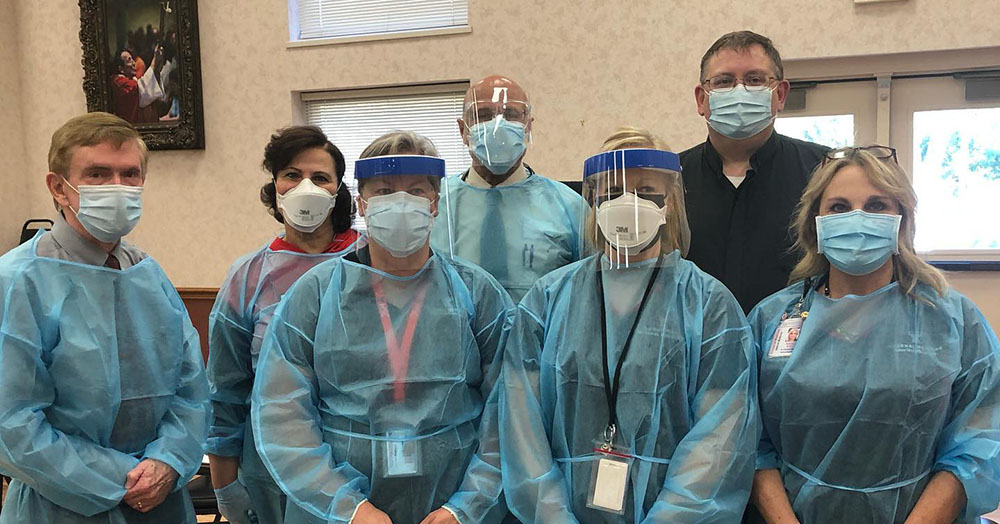What Are Coronavirus Variants And Why They May Be Important

How the Virus Works

You can envision the coronavirus as a golf ball with red tees projecting from all around its surface. The red tees are the protein spikes of the coronavirus that latch onto surface proteins of cells lining the respiratory tract. These respiratory cells have a structure on their surface, a receptor protein, that is “tricked” by the spike proteins and the coronavirus is transported into healthy lung healthy cells by these normal receptors. Once inside the respiratory cell, the virus takes over some of the cell’s metabolic processes resulting in virus replication. It also causes an inflammatory reaction, sometimes very severe, and may result in the death of the respiratory cell. The death of respiratory cells and the severe inflammation in the lung can impair the respiratory process to such a degree that oxygen cannot be transported into blood circulating through the lungs. In some of these cases, even being placed on a ventilator, cannot save the patient. Fortunately for most individuals the body’s immune response eradicates the virus before the very severe inflammation process occurs.
How the Vaccination Works
People that are vaccinated against COVID become “programmed” to develop antibodies directed against the protein spikes of the virus. The antibodies are made by blood cells called plasma cells. This antibody response in vaccinated individuals occurs very quickly after exposure (much quicker than the antibody response when an unvaccinated patient is first exposed to the virus) and the virus is quickly neutralized and eliminated from the body before cell damage and inflammation can occur. If an individual is unvaccinated, it is almost like being in a boxing match and not being able to fight for the first half of the match. The vaccinated can start fighting at the opening bell.
How Variants Develop
COVID variants develop because the coronavirus family undergoes mutations often. The mutations of consequence are generally in the sequence of the proteins that make up the spike proteins on the coronavirus. This new arrangement of proteins may make it difficult for antibodies to recognize and attack a variant of the COVID virus. In order to counter this phenomena, COVID vaccines are made to recognize multiple parts of the spike protein, and even if a sequence of the spike protein changes, the vaccine programs the plasma cells to recognize other parts of the virus spike protein and the plasma cells will still make antibodies to the virus. This helps maintain vaccine efficacy despite the appearance of new variants.
The variants receiving attention and study by the medical community are listed below. Since the COVID mutation rate is high, this list will likely continually change.
Delta Variant
It has received the most attention. It now accounts for more than 80% of the new COVID cases in the US. It was first identified in India in December 2020. Concerns about it are that it is even more contagious and causes more serious disease in unvaccinated individuals than the original Sars-Cov-2 which originated from Wuhan, China. The delta variant has become especially high in areas with low COVID vaccine rates such as Arkansas and Missouri. Alabama, Louisiana, Oklahoma and Texas also have low vaccination rates. Texas is made more vulnerable due to many COVID-positive individuals coming into the United States with the migrant border crisis. Vaccines are effective against the Delta Variant and present treatments are as effective against it as the original COVID strain. The greatest concern is the Delta Variant will be easily acquired by unvaccinated patients. It is the most transmissible of the known variants.
Delta Plus Variant
This is a newly identified variant and is of concern because the spikes appear to attach to the skin. This may be another mode of transmission in addition to the main transmission mode of respiratory droplets in the air.
Epsilon Variant
It first appeared in California. The mutation involves the spike proteins that the present vaccines attack. It may be somewhat more resistant to treatment to some monoclonal antibody treatment, but several monoclonal antibodies are available to treat COVID. Information so far does not indicate that it is more resistant to vaccines and it is not increasing in prevalence.
Lambda Variant
It was first identified in Peru and it has spread through South America. It has also been found in Texas, with over 1000 cases in the United States thus far. Although information is limited, there is no evidence that the lambda variant is more transmissible, causes more serious disease or is resistant to present vaccines.
Gamma Variant
It was first identified in travelers from Brazil. There is evidence to suggest that some of the mutations may affect the ability of antibodies (natural and from vaccine) to recognize and neutralize the virus, but additional studies are needed and it is not considered a variant of concern at present.
Alpha Variant and Beta Variant
These may spread more easily than the originally identified COVID in unvaccinated individuals. They are not yet significantly increasing in prevalence in the United States.
As a final aside, for all variants identified thus far, our diagnostic tests will identify them because these tests target other parts of the virus that are not constantly mutating (the N antigen of the virus rather than the spike proteins). Also, our present treatment options are effective against the COVID variants. The present new spike in Amarillo hospital admissions are almost all due to patients not being vaccinated and not due to the appearance of COVID variants.
Related Stories
Celebrating Veterans: TTUHSC’s General Martin Clay’s Legacy of Service and Leadership
From his initial enlistment in the Army National Guard 36 years ago to his leadership in military and civilian health care management roles, Major General Martin Clay’s career has been shaped by adaptability, mission focus and service to others.
Texas Tech University Health Sciences Center School of Nursing Named Best Accelerated Bachelor of Science in Nursing Program in Texas
The TTUHSC School of Nursing Accelerated Bachelor of Science in Nursing (BSN) program has been ranked the No. 1 accelerated nursing program in Texas by RegisteredNursing.org.
TTUHSC Names New Regional Dean for the School of Nursing
Louise Rice, DNP, RN, has been named regional dean of the TTUHSC School of Nursing on the Amarillo campus.
Recent Stories
National Academy of Inventors Names TTUHSC Faculty Senior Members
The National Academy of Inventors (NAI) has designated two current and one former TTUHSC faculty researchers as Senior Members.
The John Wayne Cancer Foundation Surgical Oncology Fellowship Program at Texas Tech University Health Sciences Center Announced
TTUHSC is collaborating with the John Wayne Cancer Foundation and has established the Big Cure Endowment, which supports the university’s efforts to reduce cancer incidence and increase survivability of people in rural and underserved areas.
TTUHSC Receives $1 Million Gift from Amarillo National Bank to Expand and Enhance Pediatric Care in the Panhandle
TTUHSC School of Medicine leaders accepted a $1 million philanthropic gift from Amarillo National Bank on Tuesday (Feb. 10), marking a transformational investment in pediatric care for the Texas Panhandle.
